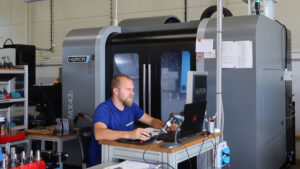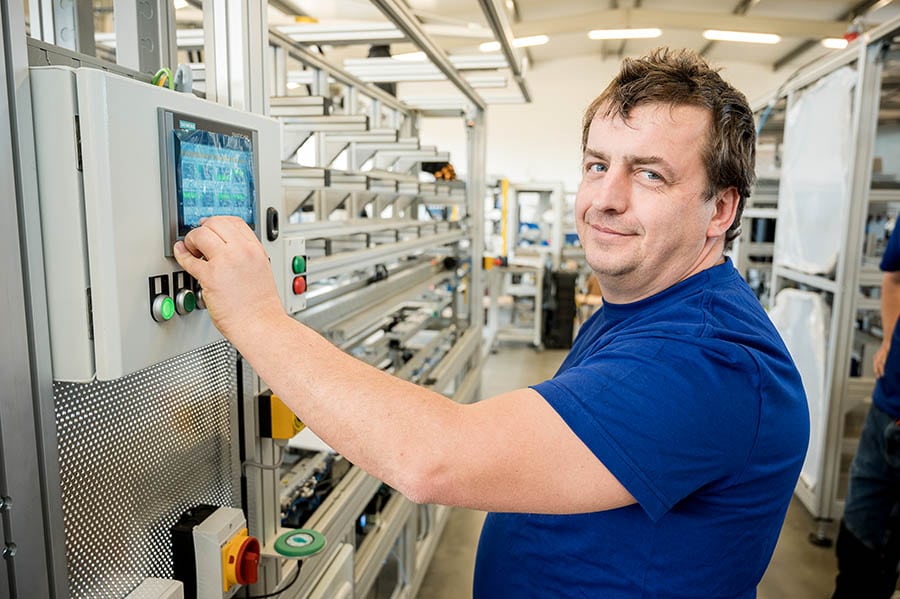Turning a crisis into an opportunity - is it a contemporary cliché or a real recipe for becoming a successful company? Although finances need to be handled efficiently, pointless saving will not get companies anywhere. So, the question should not be whether to invest but where and how.
In the debate of Hospodářské noviny on automation and robotization in industry, the leaders of leading Czech innovative companies agreed.
Companies have been facing pressure from high energy prices and inflation for some time. But even in this period, they should not hold back and wait to invest. The crisis scenario is already repeating itself several times. Good companies take opportunities to capture markets or produce products with higher added value closer to the end customer. Smaller firms naturally withdraw, making way for others.
"If a company is doing badly, it needs to cut back and trim things that don't help it; that's the first part. But then comes the real cure, and that's where what Bata said still applies. First, we have to make money, then we have to invest, and then we have to save. Every investment will increase your future returns by a little bit if it is done right," says Jaroslav Řasa, founder of Abra Software.
Moreover, automating a certain part of production is often a long-term process, so it is good not to hesitate to invest even when there is a certain cooling of the market. "Often, the problem is not to put capital into a new opportunity but to change the mindset of people in companies. When the numbers are decreasing, management lacks the creative spirit and positive thinking appropriate for investment. This is perhaps the biggest obstacle," says David Vaclav, CTO of TGS.
"In a crisis, those who move and invest gain a huge competitive advantage. Otherwise, companies have no chance to survive in the long term," adds Slavoj Musílek, Director of Central European Automation Holding.
The return on investment is decisive
Companies' appetite for investment is still high. However, they need to think about where to put their money. According to experts, investing in something that does not have a quick return is a waste of money. Choosing the right area that will move the company forward quickly and enable further investment is essential.
"Customers can be divided into two groups - one is interested in the return on investment and the other in how much it costs. And it's a pleasure to work for the former. It's not only a technical challenge, but these people understand perfectly what you offer them. And they don't ask about price. They know that in a year, they'll have the amount back. And that's what we should strive for in life. We should be smart," advises Jaroslav Řasa.
While automation and robotization are at least in the right direction for large companies, there is still potential for the use of data. Companies have a huge amount of it at their disposal, but they don't know how to use it to their advantage. The pandemic period brought lessons and a change of mindset in this regard when companies were unsure whether they would have anything to produce the next day. "That's why we need to be able to reshuffle the whole production process, to apply technologies here that can analyze and predict. Doing predictive actions has a huge future," says Slavoj Musílek.
It is important to get the data into one place and let algorithms run over it that can find connections that the human brain cannot figure out. This is commonly done in logistics, where algorithms determine what needs to be purchased. And while Czech companies are trying to collect data, they are still at the beginning of their work with it and are a bit behind compared to Europe.
They are also slightly behind in their overall approach to digital technologies. The advantage of countries west of the Czech Republic is that they hold the development and production in their own hands. Therefore, automation and robotization are much easier. In the Czech Republic, a large part of production is done in cooperation with other companies, and many manufacturing companies leave a backdoor to the versatility of production processes. These are not as efficient as when built around a specific product. "On the other hand, to build rigid production, although efficient, on one type of product but with an unclear outlook obviously takes courage," says David Vaclav.
Delays compared to the West
According to Slavoj Musilek, the Czech Republic is paradoxically hampered by the fact that it is a very technically educated nation. "However, technical details are not so essential for the final product; they do not bring a shift or a difference. If we get out of this mindset, we can make a big leap," he says.
"I think the Czech Republic is the last Western country and a little bit the first Eastern country. When I compare the behavior of people on the axis of Switzerland, Germany, the Czech Republic, and Slovakia, in Switzerland, things are least talked about, and most talked about; Germany is very ideological; there is a lot of thinking about everything. It is already a slightly political question in the Czech Republic: we want robots, but is it worth it? And in Slovakia, you can see the speed. There is a stronger willingness to do things," Jaroslav Řasa describes his experience and adds that Slovakia has highly successful companies. Still, there are not so many of them, while in the Czech Republic, there are more mediocre companies, but there are more. "Let's take from Slovakia the speed, enthusiasm, and dynamism and from Germany the fact that we will see the solution through to the end," advises Jaroslav Řasa.
"I perceive a two- to three-year delay compared to the West. And now I feel the important wave is coming because the demands are much more sophisticated. The question is no longer 'help us make so many and so many units,' but rather what technology to get right," says David Vaclav.
The debate partners are Abra Software, Automa CZ, and TGS.




